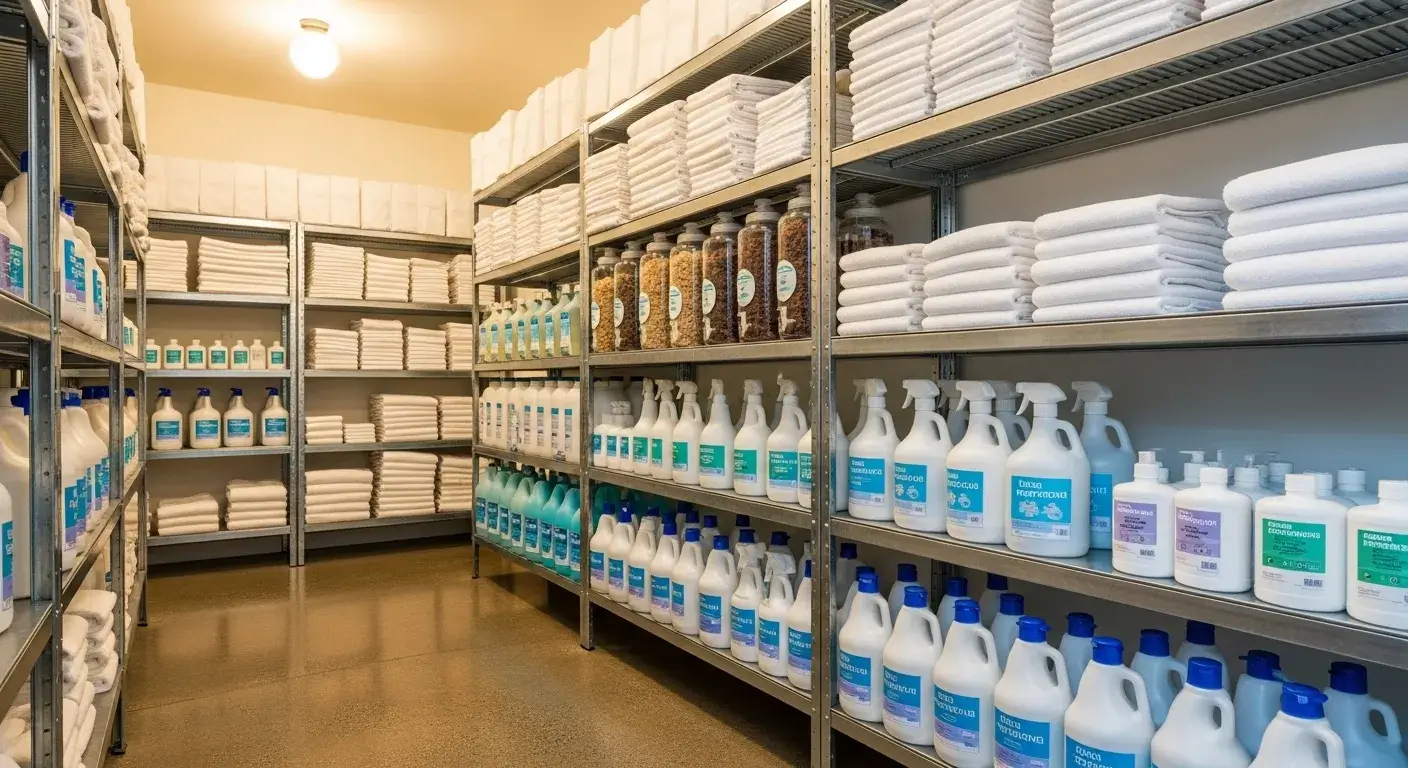
Hotel supply costs keep rising. Smart buyers find quality products at better prices. I’ll share practical ways to cut your supply expenses without hurting guest satisfaction.
Budget hotel stocking focuses on buying essential items in reasonable quantities, finding reliable suppliers who offer fair prices, and choosing durable products that last longer than cheap alternatives.
Small hotels need different strategies than big chains. Let me show you what actually works for independent properties.
What Should I Buy First When Money Is Tight?
I always tell hotel owners to focus on what guests see and touch first. Everything else can wait. Your reputation depends on clean, comfortable basics.
Prioritize bed linens, bath towels, and basic toiletries first. These items directly affect guest comfort and reviews. Buy decent quality versions that won’t need replacing every few months.
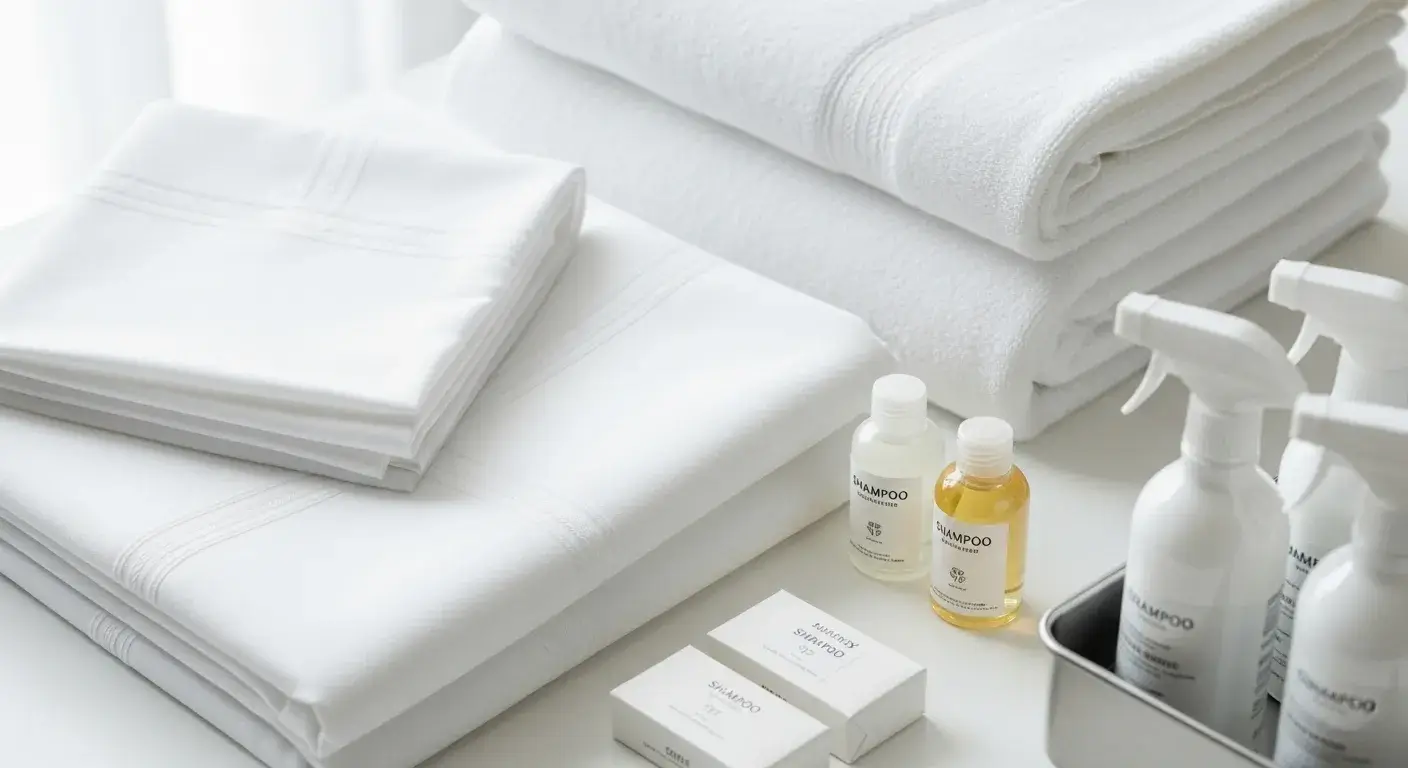
The Guest-First Shopping List
When cash is limited, buy in this order:
Week 1 priorities:
- Enough bed sheets for every room plus 50% backup
- Bath towels and washcloths (2 sets per room minimum)
- Basic soap, shampoo, and toilet paper
- Essential cleaning supplies
Week 2-4 additions:
- Extra pillows and pillowcases
- Hand towels and bath mats
- Coffee supplies for rooms that have makers
- Housekeeping carts and basic tools
Later purchases:
- Decorative items and extra amenities
- Specialty cleaning equipment
- Branded items and marketing materials
Quality vs. Cheap: What I’ve Learned
I’ve seen hotels waste money on supplies that seem cheap but cost more long-term:
Bed sheets under $15 per set usually pill after 20-30 washes. You’ll replace them every 3-4 months. Better sheets at $25-30 per set last 12-15 months.
Thin towels (under 300 GSM) don’t absorb well and guests complain. They also wear out faster. Towels around 400-450 GSM1 cost more but last twice as long.
Bargain toiletries often require guests to use more product. A $2 shampoo bottle that guests empty in one use costs more than a $4 bottle that lasts two stays.
Simple Math That Saves Money
I use this basic calculation for any supply purchase:
Cost per month of use = Purchase price ÷ Expected months of life
Example: $20 towel lasting 18 months = $1.11 per month
$12 towel lasting 8 months = $1.50 per month
The $20 towel is actually cheaper over time.
Where Can I Find Good Suppliers Without Breaking the Bank?
Finding the right suppliers takes time but saves money every month. I look for companies that understand small hotels and offer reasonable minimum orders.
Good suppliers offer fair prices, reasonable minimum orders, reliable delivery, and understand small hotel needs. Avoid suppliers who only want to sell to big chains or require huge minimum purchases.
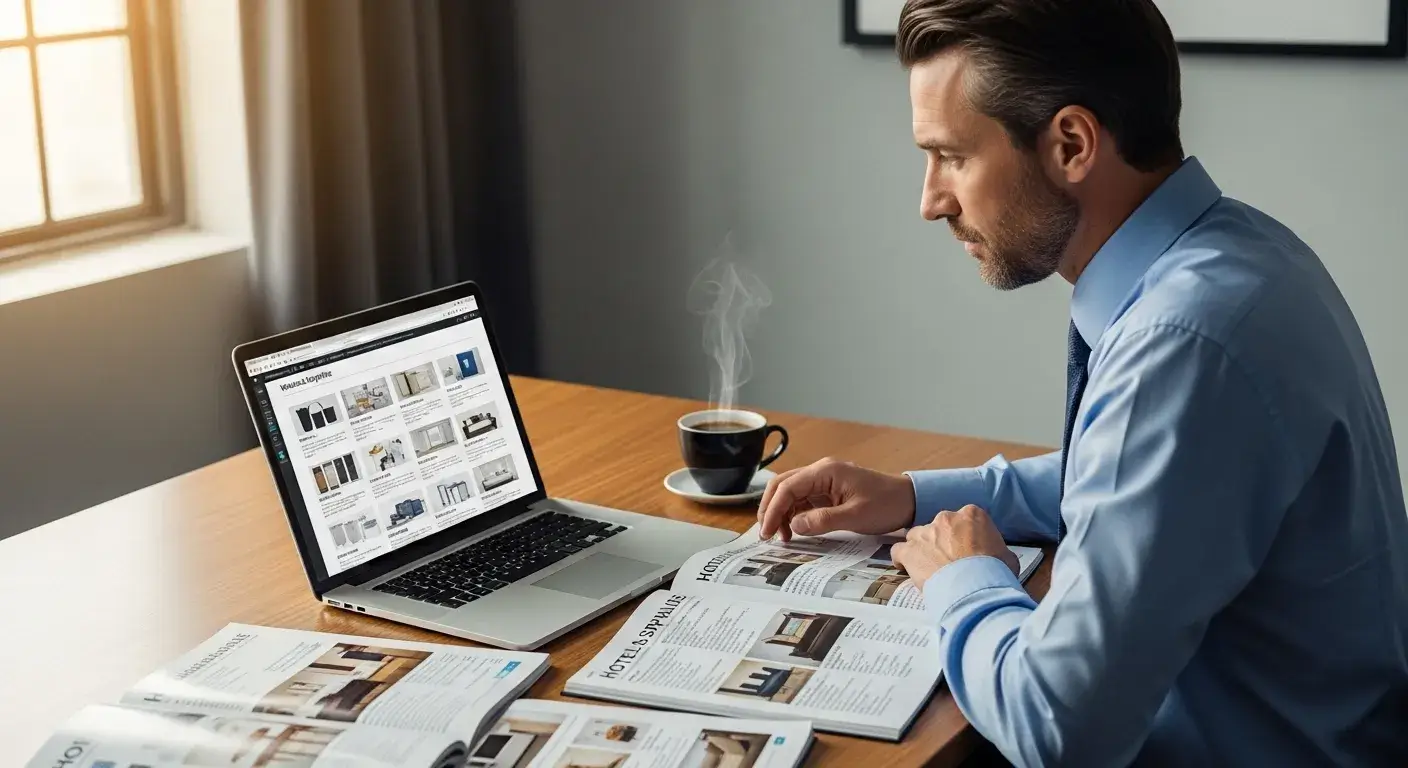
Supplier Types That Work for Small Hotels
Regional distributors often work better than national chains for small properties. They understand local markets and have lower minimum orders.
Hotel-specific suppliers know what works in hospitality settings. They stock appropriate thread counts2, GSM ratings, and commercial-grade products.
Online wholesale platforms like Alibaba or restaurant supply companies sometimes have hotel sections with good prices and smaller minimums.
Questions to Ask Every Supplier
Before committing to any supplier, I always ask:
- What’s your minimum order amount?
- Do you offer payment terms or require payment upfront?
- How long does delivery take to my area?
- Can I return items that don’t meet quality standards?
- Do you have other hotels my size as customers?
- What’s your policy on damaged shipments?
Red Flags to Avoid
Some suppliers aren’t worth your time:
Pushy salespeople who won’t let you think about purchases usually have something to hide.
No minimum order information often means minimums are too high for small hotels.
Prices that seem too good often come with hidden fees, poor quality, or unreliable delivery.
Won’t provide references from similar-sized hotels means they probably don’t serve small properties well.
Building Good Relationships
Once you find decent suppliers:
- Pay invoices on time to build trust
- Give feedback on product quality
- Ask about seasonal sales or overstock deals
- Refer other hotel owners if you’re happy
- Order regularly rather than sporadically when possible
How Much Should I Buy at Once?
Buying the right amount prevents cash flow problems while getting better prices. I calculate based on what I actually use, not what suppliers want to sell me.
Order 2-3 months of supplies for items you use regularly. This gets some bulk pricing without tying up too much cash or requiring excessive storage space.
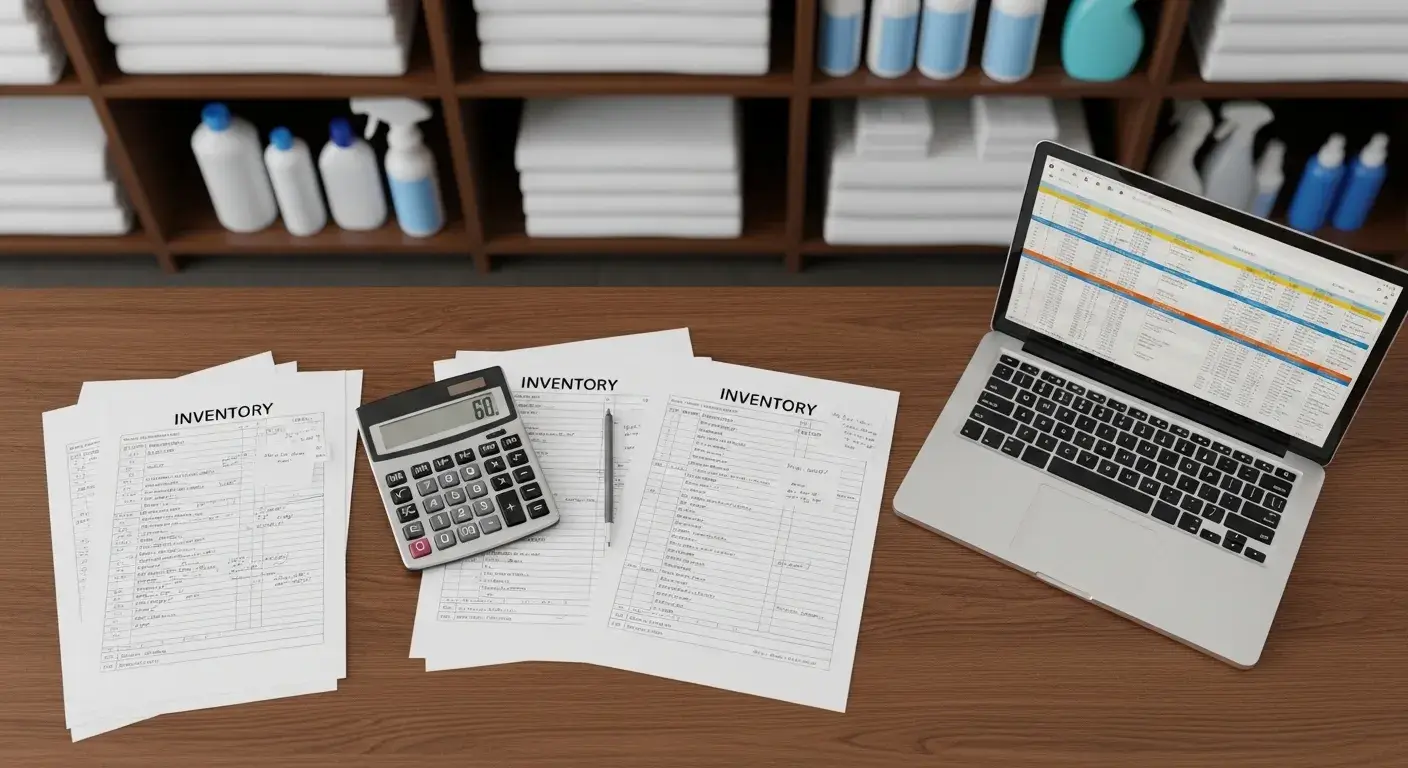
Calculating Your Real Needs
Track your usage for one month, then multiply:
Bed sheets: Count how many sets you wash weekly. Multiply by 12-16 weeks for your order size.
Towels: Track daily towel changes. Multiple by 60-90 days depending on your washing schedule.
Toiletries: Note how often you restock rooms. Calculate 2-4 months of supply.
Cleaning supplies: Monitor weekly usage. Order 8-12 weeks worth.
Storage Reality Check
Before ordering, consider where you’ll store everything:
- Linens need dry spaces away from moisture
- Cleaning chemicals need ventilation and safety compliance
- Toiletries shouldn’t freeze or overheat
- Paper products need protection from pests
If you don’t have adequate storage, smaller orders might cost less overall than damaged inventory.
Understanding Par Levels
Professional hotel operations maintain at least 3 par levels3 – one set in use, one on the shelf, and one in laundry. This prevents shortages during peak periods.
Cash Flow Timing
I schedule major purchases around cash flow patterns:
Order during strong months when you have cash available rather than during slow periods.
Split large orders if needed. Buy half now and half next month rather than straining cash flow.
Negotiate payment terms with established suppliers. Many offer 30-day payment terms for reliable customers.
Avoiding Overstock Mistakes
Common overbuying problems I see:
- Ordering based on peak occupancy instead of average occupancy
- Buying too much of seasonal items that won’t move
- Not accounting for items that expire or deteriorate
- Ordering backup supplies you don’t actually need
What Mistakes Cost Hotels the Most Money?
I’ve seen small hotels waste thousands on procurement mistakes that seem minor. The biggest problems usually involve buying decisions made under pressure or without planning.
The costliest mistakes include buying poor quality items that need frequent replacement, emergency ordering at high prices, and choosing suppliers based only on initial cost without considering reliability.
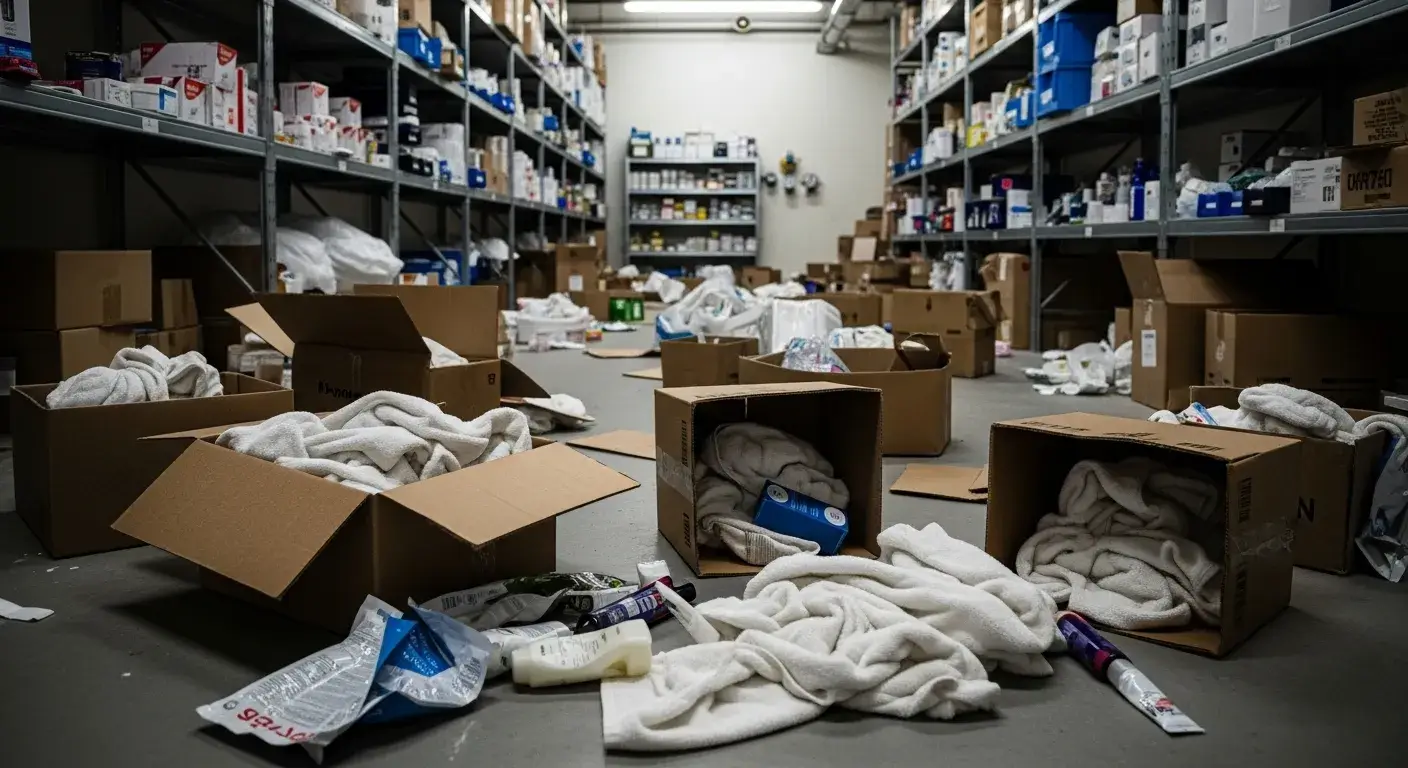
Emergency Purchasing Problems
Running out of essentials forces you to buy at retail prices from local stores. This can cost 50-100% more than planned purchasing.
I keep a simple tracking sheet for each essential item showing current stock and when to reorder. When stock hits the reorder point, I place the next order.
Weekend emergencies are expensive. Hardware stores and hotel supply emergency services charge premium prices. Better to maintain adequate safety stock.
Stockout situations result in emergency purchases at premium prices4, significantly impacting profitability and guest satisfaction.
Single Supplier Dependence
Relying on one supplier creates problems when they have issues:
- No backup when your supplier is out of stock
- No price competition to keep costs reasonable
- Service problems with no alternative options
- Potential supply chain disruptions
I maintain relationships with at least two suppliers for essential items, even if I don’t order from both regularly.
Ignoring Total Costs
Shipping charges can make cheap products expensive. A $20 item with $15 shipping costs more than a $30 item with free shipping.
Quality problems create hidden costs through guest complaints, negative reviews, and staff time dealing with issues.
Storage costs include space rental, climate control, and insurance. Sometimes smaller orders cost less than large orders requiring extra storage.
Payment Term Mistakes
Paying upfront when you could get terms gives up cash flow flexibility. Many suppliers offer 30-day payment terms after you establish a relationship.
Late payment fees add up quickly and damage relationships. Set up systems to pay invoices on time.
Not negotiating payment terms costs money. Suppliers often offer 2% discounts for early payment.
How Do Eco-Friendly Supplies Affect My Budget?
Environmental concerns influence guest choices and hotel costs. Smart eco-friendly purchasing can save money while appealing to guests who care about sustainability.
Eco-friendly supplies often last longer than conventional alternatives, reducing replacement costs over time. Many also reduce utility usage, cutting monthly operating expenses while appealing to environmentally conscious guests.
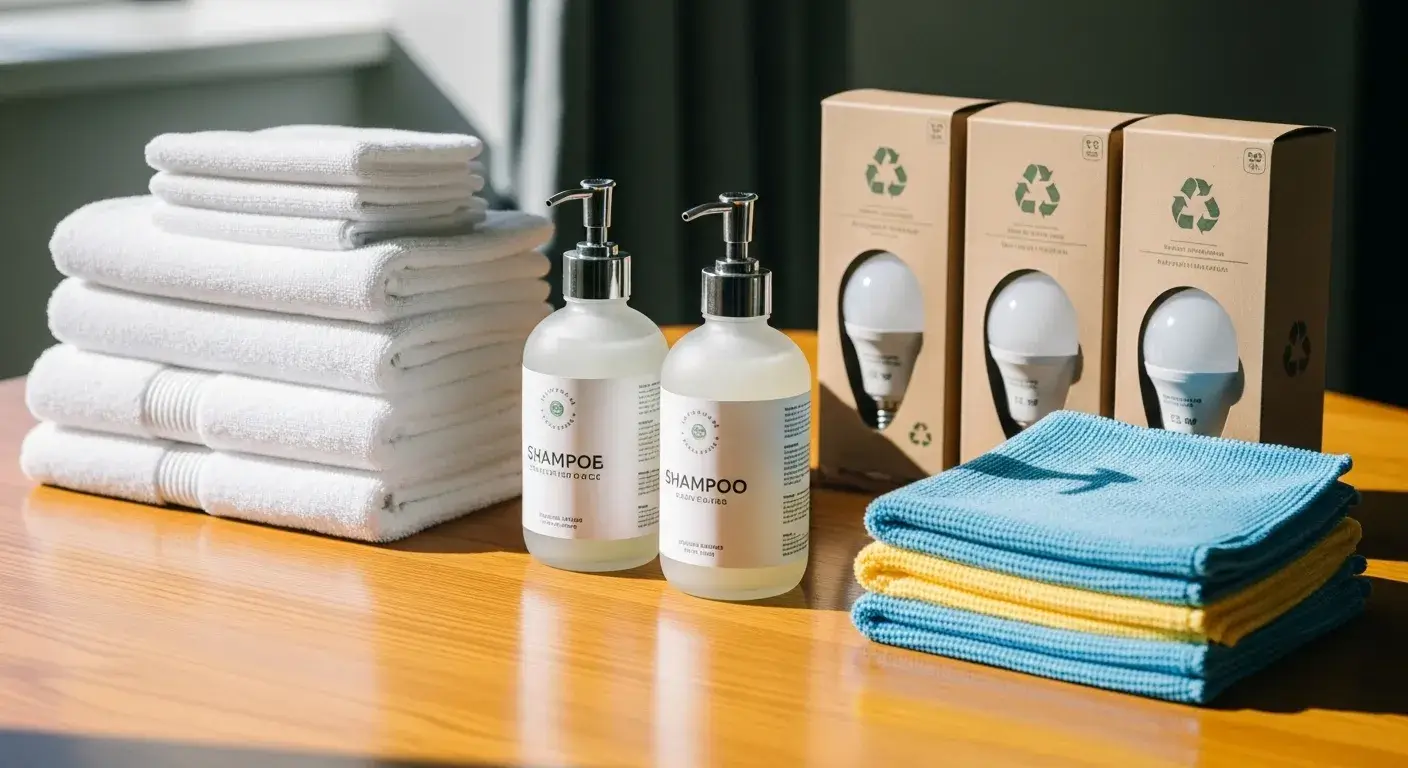
Where Green Products Save Money
Concentrated cleaning products reduce packaging and shipping costs while lasting longer. A bottle that makes 10 gallons of cleaner costs less per use than ready-to-use products.
LED light bulbs cost more initially but last years longer than regular bulbs and use less electricity.
Durable organic cotton linens resist pilling and fading better than conventional cotton, extending useful life.
Low-flow fixtures reduce water usage and heating costs without affecting guest experience.
Guest Expectations Around Sustainability
Many guests now expect basic environmental practices:
- Towel and linen reuse programs
- Recycling bins in rooms
- Energy-efficient lighting and appliances
- Bulk dispensers instead of tiny bottles
Studies show 73% of travelers prefer sustainable hotels5, and these changes often reduce costs while meeting guest expectations.
Practical Green Switches
Start with changes that save money immediately:
Bulk dispensers for shampoo and soap eliminate individual bottle costs and reduce waste disposal expenses.
Microfiber cleaning cloths clean better and last longer than paper towels or cotton rags.
Programmable thermostats reduce energy costs without requiring guest behavior changes.
Efficient washing machines use less water and energy while cleaning linens better.
Implementing Effective Procurement Strategies
Modern hospitality procurement practices6 focus on strategic cost management rather than just finding the lowest prices. This includes contract negotiations, process optimization, and smart sourcing decisions.
Avoiding Greenwashing Costs
Some "eco-friendly" products cost more without providing real benefits:
- Products with minimal environmental improvements at high price premiums
- Certifications that don’t mean much but add costs
- Green marketing on products that aren’t actually better
Focus on products that provide clear operational benefits along with environmental advantages.
Optimizing Your Supply Chain
Best practices for hotel supply chain optimization7 include vendor consolidation, technology integration, and data-driven decision making to reduce costs while maintaining service quality.
Conclusion
Smart hotel supply purchasing focuses on essential guest-facing items first, builds relationships with reliable suppliers, and chooses durable products over cheap alternatives that require frequent replacement.
-
This comprehensive guide explains GSM ratings for hotel towels, helping you understand why 400-450 GSM towels provide the best balance of absorbency, durability, and cost-effectiveness for budget-conscious hotels. ↩
-
Learn professional quality standards for hotel linens including optimal thread counts (200-300 for durability), material compositions, and assessment criteria used by hospitality industry experts. ↩
-
Industry standard guidelines for hotel linen inventory management, explaining the 3-par system that ensures adequate stock levels while minimizing carrying costs and preventing guest service disruptions. ↩
-
Comprehensive analysis of procurement technology benefits, including quantified costs of emergency purchasing and stockout situations that can impact hotel profitability by 25-50%. ↩
-
Research from the World Tourism Organization shows that 73% of global tourists prefer hotels with sustainable practices, validating the business case for eco-friendly supply investments. ↩
-
Expert guidance on hospitality procurement best practices, covering vendor management, cost optimization, and strategic sourcing approaches specifically designed for hotels and hospitality businesses. ↩
-
Professional insights into supply chain optimization strategies for hotels, including technology integration, vendor relationships, and operational efficiency improvements that reduce costs while maintaining quality standards. ↩

